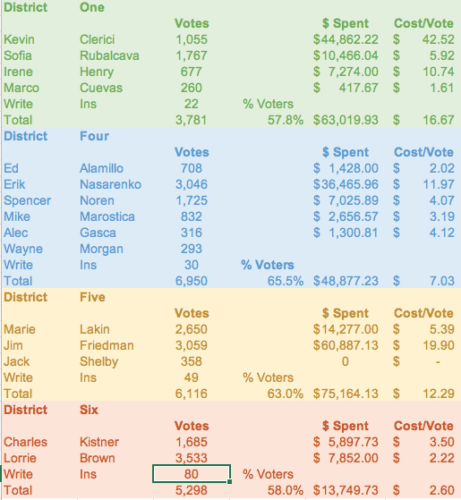How To Make Better Hiring Decisions For The Most Influential Job In Ventura
Here we go again. Ventura is hiring its fifth City Manager since 2000.
The City Manager is the most influential job in Ventura’s city government. He controls millions of dollars and impacts Ventura for years to come. Unfortunately, he does this with little oversight from a part-time City Council.
Neither the City Manager nor the City Council has shown an ability to run the city in a fiscally responsible way. As a result, the Finance Department has provided the City Council with a projection that the City of Ventura will lose money over the next five years.
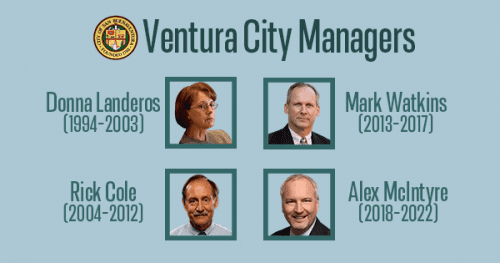
For the fifth time since 2000, Ventura is hiring a new City Manager.
Poor Choices Lead To Financial Disaster
The City Council does a poor job of overseeing the City Manager. Former City Manager Rick Cole played financial games with the budget. He moved $7.5 million from the Public Liability Fund, Workers’ Compensation Fund, and Information Technology Fund to other areas in the budget. These moves made it appear as if the city’s budget was balanced. Unfortunately, the Council didn’t catch the manipulation or was unwilling to investigate further.
Former City Manager Donna Landeros reallocated $9 million earmarked for the proposed Convention Center to various city programs. Unfortunately, no one can determine what happened to the money.
Former City Manager Mark Watkins acted as the chief cheerleader on Measure O. He touted the money was for city services. Yet, oversight for Measure O has disappeared as the citizens’ committee has several vacancies. Measure O money will ultimately go toward employees’ pensions, not city services.
Moreover, the City Council’s decision to hire Mr. Watkins cost the Ventura taxpayer’s money. When Mr. Watkins took the most influential job in Ventura, the Council chose to increase his salary and bonus to $242,059. That was a $52,718 increase over his predecessor, Mr. Cole. Former Councilmember Christy Weir claimed hiring Mr. Watkins would save the city more money than the rise in his salary. Unfortunately, the figures don’t bear that out over the four years he served in the role. And now, Mr. Watkins receives his retirement pension based on his highest salary of $242,059.
The City Council put Mr. McIntyre on paid administrative leave. At the same time, Ventura hired an independent auditing firm to review city credit card usage from the city’s executive team and other spending. On December 12, 2022, Mr. McIntyre resigned before the audit results became public. The City Council accepted his resignation and paid him $150,000 severance pay.
There Will Be Pressure To Hire Fast
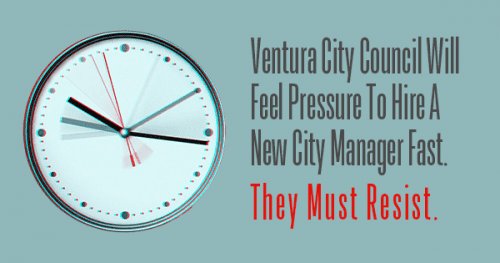
The Council will feel internal and external pressure to act quickly. They’ll want to fill the vacant position immediately to provide leadership at City Hall. In addition, citizens will demand someone to manage the Thomas Fire and COVID-19 recoveries. The search firm Ventura hired to help find someone for the position will add to the pressure, too. Ventura pays the search firm when the new City Manager accepts the job. Typically, the fee is three months of the City Manager’s starting salary. In this case, it’s $76,177.
A hasty decision now could lead to adverse consequences in the future. Therefore, the Council should be deliberate, bold and thoughtful when hiring. Likewise, they should think creatively and progressively as they make their selection.
Balancing these goals will take work, and the Council must resist succumbing to the pressure.
Qualities Ventura Needs In A City Manager
The challenges facing Ventura’s new City Manager have never been more significant. The city is recovering from back-to-back adversities and requires steady leadership. Here are some attributes that the City Council should demand of the new City Manager.

Fiscal Responsibility
The new City Manager will inherit a budget with declining revenue and the possibility of a recession in the general economy. Therefore, the new City Manager must thoroughly understand the city’s budget and financial figures. In addition, they must include an understanding of fiscal policies, procedures and controls. For example, Ventura is spending over $100,000 on auditors to investigate city credit card usage by City employees and executive spending. Taxpayers wouldn’t have to pay this if the city accounting staff and the current assistants and deputies in the City Manager’s office had done their job and had implemented proper controls at City Hall.
Accountability
Residents expect the most influential job in Ventura to be accountable. President Truman said, “The buck stops here.” In Ventura, the “buck stops” at the City Manager’s desk, which applies to all the City Manager’s subordinates. The top person is accountable for results, even if the underlings underperform.
Communication
The City Manager must be able to communicate with various groups. For example, they must be able to collaborate with city staff, labor unions, the City Council, the media and the community. Also, the City Manager needs to articulate the city’s plan to move ahead following the Thomas Fire and COVID-19. They must also communicate changes in department policy and practices.
Transparency
Transparency begins with knowing how the City Manager is performing. The city should use Standards of Performance (SOPs) to measure achievement. Currently, the City Manager doesn’t have SOPs listed on its website. The Council should prepare SOPs, and the city should post them for the public to review. What’s more, the City Manager’s accomplishments should be in the public record. Citizens deserve a yardstick to measure if the city meets the City Council’s directives.
Results Driven
The new City Manager should be goal oriented and a self-starter. Once the City Manager understands the Council’s direction, this individual cannot wait for an elected, part-time City Council to implement action. The new person must be able to meet deadlines to produce measurable results on the projects the city commits to completing. The new Council intends well, but they are part-time. They do not have the ability or tools to implement their policy decisions and then follow up to ensure others successfully implement them. Only the City Manager and his lieutenants can do that.
Delegation
Delegating responsibility will be crucial to the new City Manager. Yet, delegation doesn’t mean surrendering responsibility. On the contrary, the new City Manager must regularly inspect the assigned projects for results and, if necessary, take action for missed goals.
What The City Council Must Avoid When Hiring A City Manager
Equally crucial to the qualities to look for in a new City Manager are the things the City Council must avoid when hiring that person.
Requiring Former Public Service
Nothing limits the candidate pool like requiring previous public service at the city, county or municipal level. Past City Managers had a bureaucratic background. Locking in on prior public service leads to a “status quo” in city government. Little new or original thinking will come from other public servants. If the city wants to change and improve, finding a person with a business management background would be more beneficial in the long run.
Negotiated Automatic Raises
One salary negotiating tool for a prospective City Manager is to ask for—and usually receive—a salary increase after a specified period. Mr. McIntyre negotiated such a deal, and the increase was unwarranted. Base all increases on meeting or exceeding predetermined measurable results. Tenure should not be a criterion.
Long-Term Severance Packages
Mr. McIntyre also negotiated a $300,000 severance package over twelve months if the City Council terminated him without cause. The severance was too much and will last for too long. Any negotiated severance packages should be at most six months.
Residency Requirements
Requiring a candidate to live in or close to Ventura limits opportunities. Local applicants may only be able to offer new ideas if they know a little history of what came before. It limits the ability to break from entrenched solutions and historical changes. Making needed changes requires fresh thinking that a local person may not have.
Unsuitable Compensation
Each successive City Manager has received higher salaries and benefits. Higher compensation hasn’t produced better outcomes from the City Manager, though.
The City Council should be critical when determining the salary for the new manager. The current compensation for Ventura’s City Manager may be too high. For example, outgoing City Manager McIntyre received $304,707 to manage a General Fund of $126 million and 600 employees. By contrast, Mike Pettit, Ventura County Assistant County Executive Officer, receives $322,355 to administer a $2.7 billion General Fund and 10,000 employees.
Only an extraordinary candidate with a proven track record would warrant a higher salary. Yet, while compensation expenses are an essential concern, now is not a time to “pinch pennies” for the right hire.
Editors’ Comments
Hiring the next City Manager is paramount. The City Manager is the most influential job in Ventura’s city government. The new manager will be responsible for healing Ventura from back-to-back adversities. Hiring the right candidate will affect Ventura for years to come. There can be no higher priority for the incoming City Council.

The Council should be slow, bold and thoughtful when hiring. They should select a replacement creatively by thinking outside the box. What they do now echoes in eternity.
Tell The City Council Not To Act In Haste When Hiring A City Manager
Below you’ll find the photos of our current City Council. Click on any Councilmember’s photo and you’re email program will ready to write directly to that Councilmember.
Let them know what you’re thinking. Tell them what they’re doing right and what they could improve upon. No matter what you write, however, share your opinion. Participating in government makes things better because our city government is working for all of us.
 |
 |
|
 |
 |
|
 |
 |
|
 |
For more information like this, subscribe to our newsletter, Res Publica. Click here to enter your name and email address.






 The most practical option available to the Council was to appoint a replacement. Four of the Councilmembers didn’t want to wait for a special election in November 2021. Nobody wanted to wait until November 2022 to fill the vacancy because of the concern about not having a seventh vote to break any tie vote.
The most practical option available to the Council was to appoint a replacement. Four of the Councilmembers didn’t want to wait for a special election in November 2021. Nobody wanted to wait until November 2022 to fill the vacancy because of the concern about not having a seventh vote to break any tie vote.
 The logistics of the procedure are grueling for both the applicants and the City Council. Interviewing all fifteen candidates in one sitting will be wearisome. It’s hard to imagine that the Councilmember’s attention will be as sharp at the end of the day as it was in the beginning.
The logistics of the procedure are grueling for both the applicants and the City Council. Interviewing all fifteen candidates in one sitting will be wearisome. It’s hard to imagine that the Councilmember’s attention will be as sharp at the end of the day as it was in the beginning.








 The Council made its November decision based on data presented on September 23, 2020, a month and a half earlier. The Council received no updated data on which to decide. If they had, the decision might have been different.
The Council made its November decision based on data presented on September 23, 2020, a month and a half earlier. The Council received no updated data on which to decide. If they had, the decision might have been different. estimates are optimistic. “We believe we’re conservative not to paint too bleak a picture,” Mr. Coon told the City Council on January 11, 2021. And, our City Council makes long-term decisions based on the short-term data they receive.
estimates are optimistic. “We believe we’re conservative not to paint too bleak a picture,” Mr. Coon told the City Council on January 11, 2021. And, our City Council makes long-term decisions based on the short-term data they receive. It seems clear that city staff provided fluid, optimistic data to the Council for their decision. Mr. Coon explained the projections, saying, “We are feeling alright with the additional projection of $1.5 million in Sales Tax for the current fiscal year. It is something that we definitely want to keep an eye on, especially if we start to see more businesses close.
It seems clear that city staff provided fluid, optimistic data to the Council for their decision. Mr. Coon explained the projections, saying, “We are feeling alright with the additional projection of $1.5 million in Sales Tax for the current fiscal year. It is something that we definitely want to keep an eye on, especially if we start to see more businesses close.





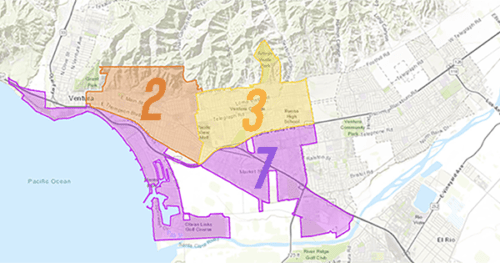
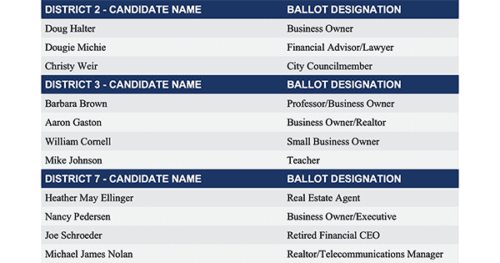 District 2
District 2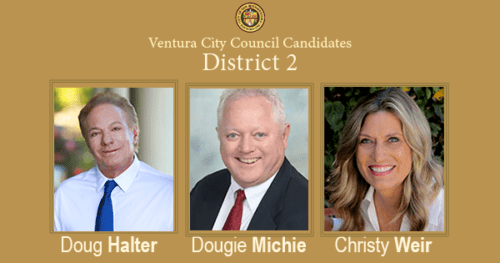
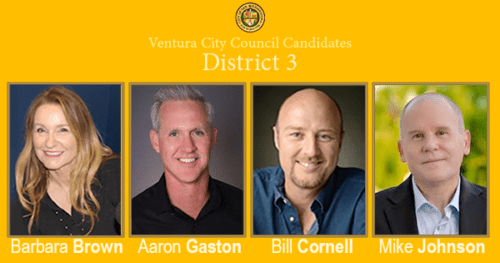
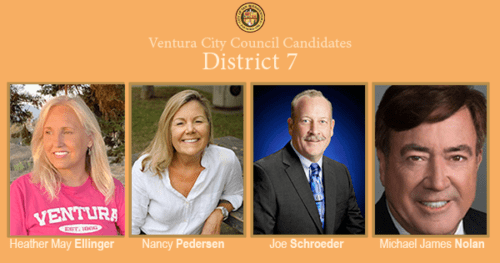
 Water will be among the costliest issues the City Council will face in the next four years. Ventura Water is asking the Council for over $300 million, making it as expensive to the city as public safety.
Water will be among the costliest issues the City Council will face in the next four years. Ventura Water is asking the Council for over $300 million, making it as expensive to the city as public safety.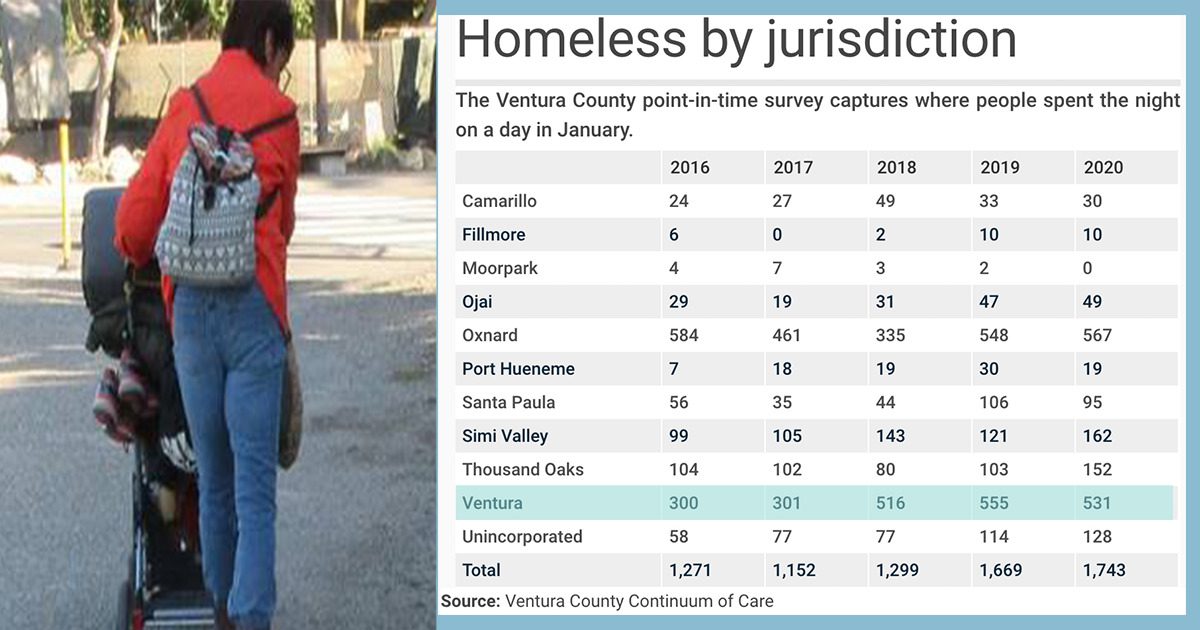



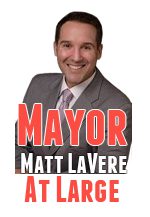





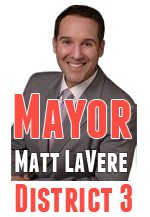





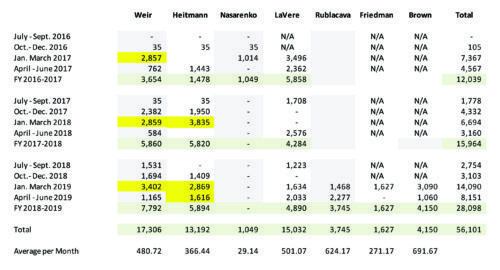
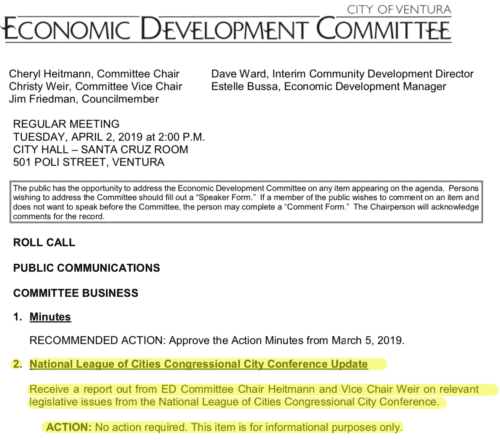
 The justification may be to learn the “best practices” from other cities attending the conferences. What best practices did we learn on homelessness from representatives from Sacramento, Los Angeles, San Francisco, or Seattle? Homelessness in those cities is worse than it is in Ventura, and it’s not improving. Or did we learn something about water from Sacramento? Except, the California River Tunnel isn’t working out so well. Or did the reps from Washington, D.C., or Sacramento teach us about budgeting? The fact is, our reps need to convey any best practices we learned at those conferences need to city staff. The staff are the ones to put in place new ideas in City Hall. And without written guidelines, implementing the changes is nearly impossible.
The justification may be to learn the “best practices” from other cities attending the conferences. What best practices did we learn on homelessness from representatives from Sacramento, Los Angeles, San Francisco, or Seattle? Homelessness in those cities is worse than it is in Ventura, and it’s not improving. Or did we learn something about water from Sacramento? Except, the California River Tunnel isn’t working out so well. Or did the reps from Washington, D.C., or Sacramento teach us about budgeting? The fact is, our reps need to convey any best practices we learned at those conferences need to city staff. The staff are the ones to put in place new ideas in City Hall. And without written guidelines, implementing the changes is nearly impossible.

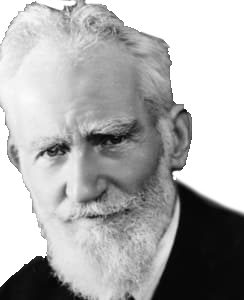


 Ventura Water forces the City Council to get their information from the General Manager. Thus bypassing the entire reason the city established the Water Commission.
Ventura Water forces the City Council to get their information from the General Manager. Thus bypassing the entire reason the city established the Water Commission. You may not have heard about the incident. It’s not because Ventura Water didn’t announce it. They did. Ventura Water fulfilled the letter of the law, but it may have missed the intent behind it. Meeting the legal requirement seems to be the minimum standard. Yet setting the bar at the lowest level may place everyone’s health at risk in the future.
You may not have heard about the incident. It’s not because Ventura Water didn’t announce it. They did. Ventura Water fulfilled the letter of the law, but it may have missed the intent behind it. Meeting the legal requirement seems to be the minimum standard. Yet setting the bar at the lowest level may place everyone’s health at risk in the future. In July, Ventura Water withheld information from the Water Commission. A panel of experts examined
In July, Ventura Water withheld information from the Water Commission. A panel of experts examined 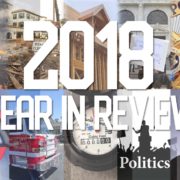


 The City Council waffles on second-story height restrictions for
The City Council waffles on second-story height restrictions for  The City Council instructs Ventura Water to focus on connecting to State Water
The City Council instructs Ventura Water to focus on connecting to State Water